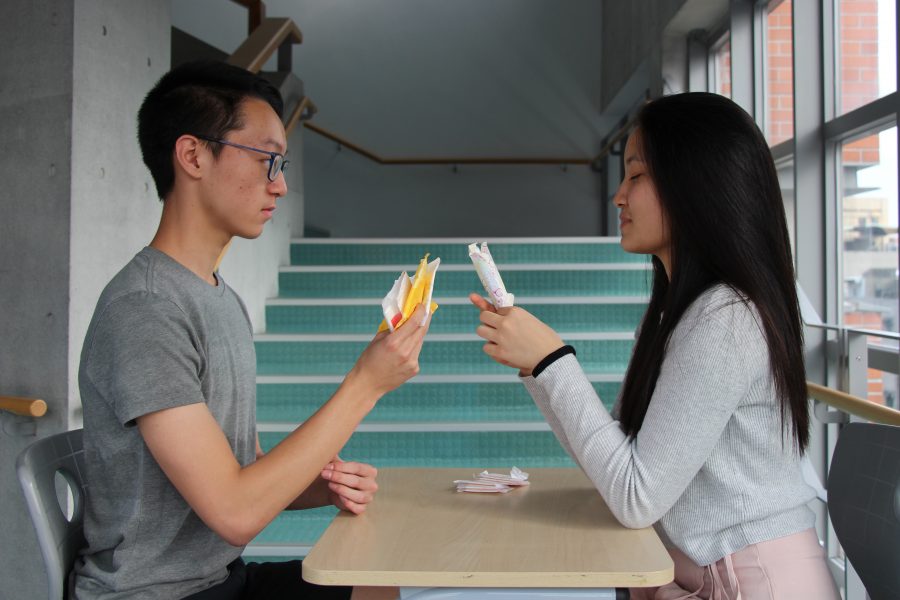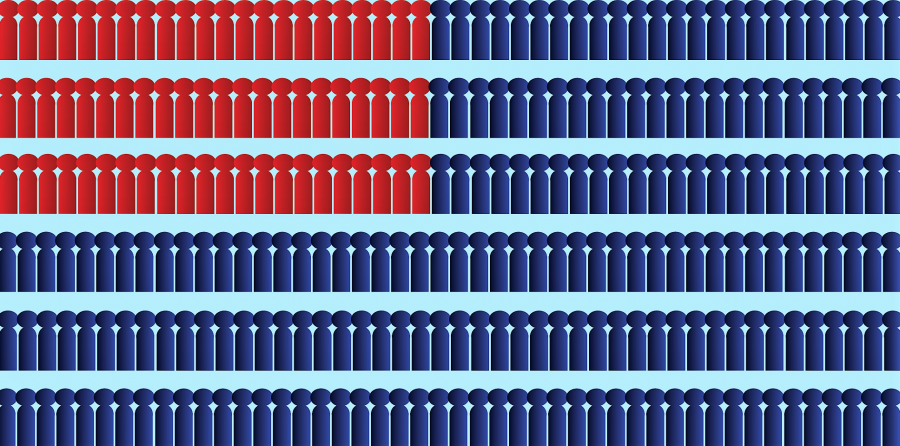Without menstruation, civilization as we know it would not exist. Yet, the very society that is built on female periods often shames this vital part of the reproductive cycle in innumerable ways. Here, The Blue & Gold’s Christine Lin and Julian Lee share female and male perspectives on the social stigma surrounding periods.
Christine: Before we decided to tackle this article, I found out that Mayo Clinic’s symptoms of premenstrual syndrome (PMS) include mood swings, anxiety, depressed mood, social withdrawal crying spells, food cravings, and poor concentration. Though these are listed as symptoms that women experience on days leading up to their periods, I can attest that this description sounds like every teenager at TAS during exam week.
Julian: …or, you know, during a regular week. I mean, “food cravings” and “crying spells” sum it up pretty well for most students.
Christine: Exactly. Guys and girls alike experience these symptoms, period or no. Oftentimes, however, when a girl specifically gets angry, some people would ask with a snide tone, “Are you on your period?” This question is incredibly bigoted as it belittles the girl’s emotions and makes her issues seem invalid, even when she’s perfectly justified in complaining about something. One situation that helps to illustrate the insensitivity of asking this question is a story that Charlene Tsai (’19) told me. A male friend was poking her repeatedly, so she was naturally irritated and said, “Don’t touch me.” The friend then sneered, “Are you on your period?” She was not. Anyone would be annoyed with persistently being touched, and this question only aggravated her even more.
Julian: One way to think about this is that even if a guy acts moody, society tends to respect his concerns more instead of dismissing them as a period hormone-induced tantrum. There is a sexist perception that girls are less able to control their emotions than guys, and many immature boys use this as an excuse for immature behavior. They do things that are unacceptable and then when the girl, like Charlene, rightfully complains, they blame her for “overreacting.” Girls are not always overreacting, nor are they constantly being controlled by their period mood swings. Rather, they can consciously choose to be angry, and it is important to respect that. Like Rose Hsu (’18) says, we should all support women in expressing anger and aggression when such strong emotions are justified.
Christine: To be honest, I’m not sure how to differentiate within myself between heightened hormones and regular anger or sadness. Since it is scientifically proven that PMS actually occurs in the days preceding a girl’s period (not, as commonly thought, during the period itself), you can’t really tell when a girl’s emotion is all voluntary. I know from experience that sometimes, some girls do cry for no significant reason at all when they are on their periods. For example, Vanessa Su (’19) says that she once cried just because her sister stole the front seat of the car from her.
Julian: That’s true: obviously, there are cases of girls on their period lashing out over completely innocuous things, but boys can’t use these few cases and the effects of PMS as a blanket excuse to be rude. It’s common among many guys when girls get angry at them to think, “Well, she’s just crazy because of her period,” without even considering the possibility that they might be in the wrong.
Christine: This type of mentality sadly lasts past high school, as many adults still practice period-shaming (see Trump, Donald). In August 2015, the president attacked Fox News reporter Megyn Kelly’s professionalism by blaming all the “blood coming out of her wherever” for her aggressive remarks towards him.
Julian: Trump missed the point that Kelly was attacking him not because she was PMS-ing, but because he was being ignorant. But so far we’ve been focusing on the male side of this topic. Is there a difference between a girl asking about periods, and a guy doing so?
Christine: Actually, oftentimes, many girls are not at all ashamed of talking about their periods: in fact, they often ask each other this question to bond. I know that in more private settings–the girls’ locker room especially–many girls complain together and compare symptoms. I suppose that it’s just not socially acceptable to talk about it in public since there is a fear that guys would be apprehensive.
Julian: Yes, and I do think that there is an unspoken stigma against periods, in Asian culture and in TAS. Ashley Chen (’19) said that “although there is a word for period (??), many Taiwanese girls just refer to it as “??,” translating loosely to “that thing”–local girls apparently treat periods like Voldemort and refuse to say the real name.
Christine: In TAS as well, this prejudice against periods begins as early as elementary school. A girl whose body is perhaps developing earlier than most of her peers first experiences this stigma when she hears the whispers “Ew, she’s on her period.” From third-grader boys, these comments are understandable, but from high schoolers who have taken sex education, these assumptions just seem ignorant and childish. Because of the fear of judgmental looks and ridicule from high school boys, many girls have become experts at hiding their pads and tampons. They slip them in jacket pockets and the waistbands of their leggings, stuff them into zipped up bags, and generally do anything they can to avoid the “embarrassment” of exposing their hygiene products in public.
Julian: However, it’s not all gloom and doom–some TAS guys do show real maturity in addressing period-shaming. When we presented Benjamin Loo (’18) and Lucien Chiu (’19) with a tampon, they were both quite comfortable with it, and neither showed any signs of disgust or shock. When asked their thoughts, Benjamin said: “I won’t judge–we should just let them be,” while Lucien said “I think it’s fine.” True, nobody would dare say anything explicitly period-shaming on record, but still, I think their attitudes indicate that a part of the TAS community is more encouraging and accepting towards the topic of menstruation.
Christine: So, girls, there is no reason to feel embarrassed about a natural process which goes on in your body. If you want to complain, complain. Those who ask annoying questions are either uninformed or insensitive; besides, you might find that the community is more accepting than you think.
Julian: Originally, I didn’t want to write this piece: it was my sister who came up with this article idea during our brainstorming session for this issue and practically forced me into doing this. But I’m glad that she did, because through this process, I’ve had to educate myself about periods through discussing with Christine and other girls like Kayleigh Chen (’18) and Becky Roffler (’18). So to guys, try asking girls for their perspectives on this topic, and sharing your own as well: you’d be surprised at how much you can learn.
Christine: To everyone: don’t make the assumption that a girl is on her period as soon as you see signs of grumpiness. She might be–but it’s not up to you to decide what is making her act this way.







